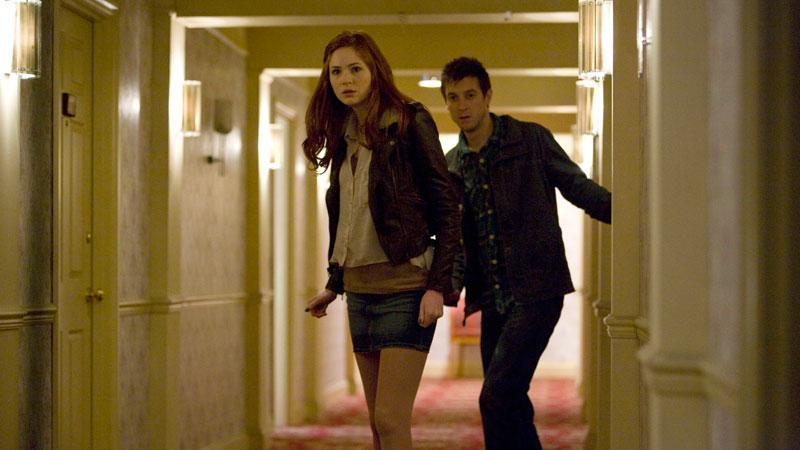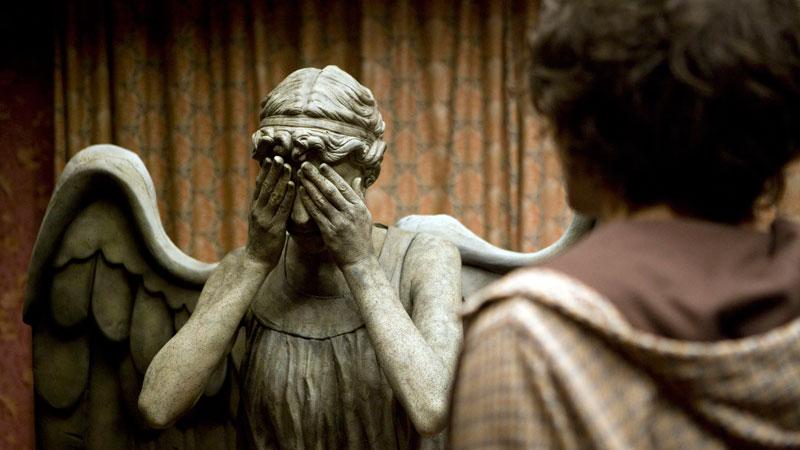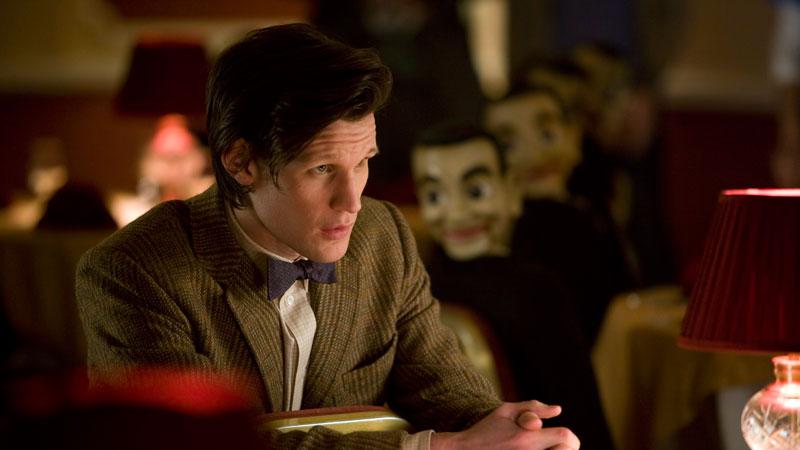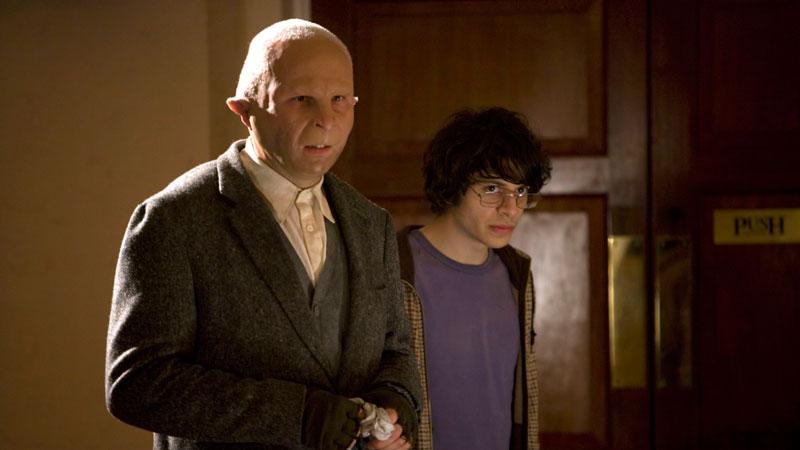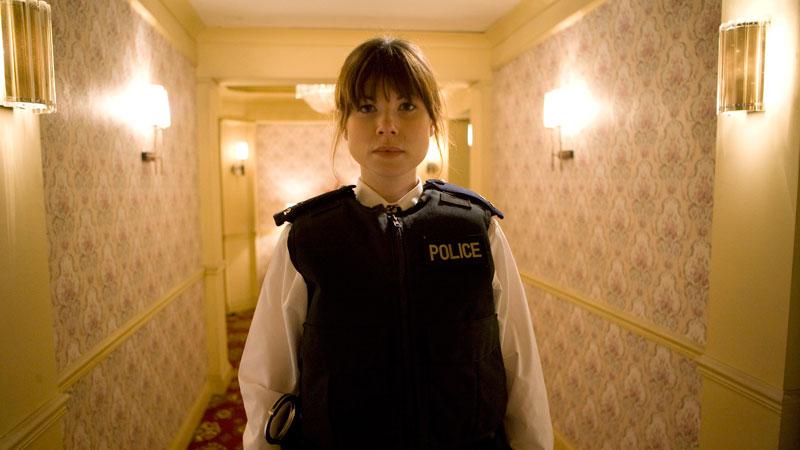Mr. Harvey: DOCTOR WHO is a Guilty(?) Pleasure
 Series 6, episode 11: “The God Complex”
Series 6, episode 11: “The God Complex”
Spoilers Abound.
“An ancient creature… drenched in the blood of the innocent… drifting in space through an endless shifting maze… for such a creature… death would be a gift.”
And so we’ve come to the only logical place we could have. Since Steven Moffat began his run on the series, he’s been dismantling the god-like Doctor bit by bit. With Tennant’s 10th Doctor, we got the Angry Lonely God, and in episodes like “The Last Of The Time Lords” and “Forest of The Dead”, and especially in “The Waters of Mars”, we see the Doctor knows what his reputation is, and even begins to believe it himself. He’s become the arbiter of Time and Space, and all you have to do is look him up to see why you should run.
With the arrival of Matt Smith in “The Eleventh Hour”, the Doctor continues to bank on his reputation, and whether it’s the Atraxi or a fleet of every enemy he’s ever had, he used the legend that had grown up around him to his advantage, over and over. But as we moved into Smith’s second season, we begin to watch Moffat’s very critical look at the idea that the Doctor can’t be beaten, that his reputation and his actions have far more impact than he knows, and that his adventuring through time and space leaves a lot of damage behind. The 11th Doctor has been shown over and over to be fallible, and more importantly, he’s been shown to be aware of the mistakes he’s made… and of the darkness inside him. The Dream Lord from “Amy’s Choice”, the revelations of “A Good Man Goes To War”, and now this… simply put, Moffat and Smith have given us a Doctor who is faced over and over with the realities of what his impact on the universe is. It’s not always positive, and Smith does a wonderful job of portraying the age, the guilt, and the underlying self-hate the Doctor hides behind that often childlike sense of wonder and joy. The consequences of his travels weigh heavily on him, and it does seem fitting that as he heads to what appears to be his death, the Doctor reflects on the lives that have been sacrificed for him, the danger he puts those he cares about in, and the many times he’s failed to save the innocent.
Rather lengthy intro isn’t it? Well, those are the things we’re really talking about in “The God Complex”, another episode this series with a title specifically about one of our main characters. Sure, the TARDIS crew is trapped in a “building”, facing off against a creature that was once a “god”, so we have the double play on words, but it’s quite clear that it’s the Doctor who has the complex in question.
While at first “God Complex” looks like another stand-alone ep, it’s really quite clear that it’s part of the larger arc, especially when looking at Arthur Darvill’s Rory. When he tells Amy that he feels like he should notify Rita’s next of kin because of how much the Doctor likes her, watch his face. He’s not actually joking. When he talks about traveling with the Doctor in the past tense, and when he points out that most victories don’t involve saving the universe, you can see that he’s had enough. With everything that has happened this season, from the Doctor’s death, Melody/River to Older Amy, Rory has seen the dark side of travel in the TARDIS, and since he doesn’t share the hero-worship Amy has for the Doctor, it’s been Rory who has vocalized, especially in “The Girl Who Waited”, the very real consequences of it on those the Doctor calls his friends. Watch Matt Smith’s face when his Doctor talks to Rory too, and you can see that he knows exactly what Rory’s thinking.
Here also is the part where we have to discuss the elephant in the room. While I’ve really liked so much this season, and really felt that story-wise, character-wise and sheer wonder-wise Moffat and Co. have done beautifully, they really dropped the ball on how Rory and Amy have dealt with Melody/River. Because they haven’t. At all. It seems that we’re supposed to find the resolution of “Let’s Kill Hitler” and River’s path to becoming the person they know as the end of their quest to be reunited with their child. As a parent, as a viewer, that’s nonsense, and sure, we know that stuff happens between the episodes, but c’mon, really? One one hand I get it… DOCTOR WHO has always been episodic, but while this season has been arc heavy for a show that isn’t known for them, when you deal with fundamental issues like parenthood and family, you have to DEAL with them. If you set up big situations like the kidnapping of a child and turning her into a weapon, having that child become your crazy best friend isn’t actually a solution any parent would accept. With only two episodes left, and Amy and Rory only in one of them, it’s a big, bad, wrong hole in the story. And with one hand on the elephant, we turn to Amy.
I’ve said it before, the writers have NOT been kind to Karen Gillan’s Amy Pond this season. And with what she’s been through, that Amy isn’t a lot more like Older Amy, or pointing a gun at the Doctor like she did River and demanding answers seems surprising, but here we look hard at why she keeps putting her faith and trust in the Time Lord. There is hero worship, there is gratitude at being returned for, there is love and all those very human reactions to someone as wonderful and kind and magical as the Doctor. But she’s also holding onto all of those things despite the fact that the Doctor takes her into danger over and over, that she’s lost her child because of her traveling with him, that she’s watched Rory die more than once… for all that Amy is smart and bold and independent, when it comes to the Doctor she has a massive blind spot. And that almost, almost goes a long way to explaining her acceptance of losing the opportunity to raise Melody. Almost, but not enough.
What it does do is put her in danger again, and it takes the active breaking of that blind faith by the Doctor to save her from the Minotaur. That it happens in a room where 7 year old Amy waits in vain is great, but despite a wonderful performance by Smith, the scene seems too short, too simple, or maybe it’s because, just as we haven’t dealt with Melody’s loss, we don’t get the scene where Amy takes the Doctor to task for the way he has let her down. I personally like the distance between the two of them at the end when the Doctor leaves them behind, because it felt like two people who have severed a link between them, who have fundamentally altered the relationship they had. It’s uncomfortable when that happens, and there’s an awkwardness and a sadness that isn’t just about the Doctor leaving: It’s about the idea of the Doctor changing for Amy Pond.
“I brought them here. It was their choice, but offer a child a suitcase full of sweets and they’ll take it. Offer someone all of Time and Space and they’ll take that too. Which is why you shouldn’t.”
“I can’t save you from this, there’s nothing I can do to stop this. I stole your childhood and now I’ve led you by your hand to your death. And the worst thing is I knew, I knew this would happen. This is what always happens.”
“Forget your faith in me. I took you with me because I was vain. Because I wanted to be adored.”
“Look at you. The glorious Pond. The Girl Who Waited for Me. I’m not a hero. I really am just a madman in a box. And it’s time we saw each other as we really are… Amy Williams.”
Matt Smith’s performance here is fantastic… each of those quotes is delivered with a sadness and a sense of self-knowledge that we really haven’t seen before in the Doctor, at least not to this level. He knows what he’s done, he knows what he’s doing, and he knows that what he offers is irresistible. And that’s the problem. He’s brought Companion after Companion into the TARDIS and into harm’s way for centuries, and they all fall a little in love with the idea of the Doctor, that madman with a box, adventuring through the universe and beyond. But look at Adric, Katarina or Sara Kingdom. They died because they stepped into the TARDIS. Look at the way the Doctor has used his friends as weapons, or left them without a word. It IS what always happens, and he knows it. How many times has Rory died? How many times has Amy? Martha. Rose. Donna. River.
“What’s the alternative? Me standing over your grave? Over your broken body, over Rory’s body?”
The Doctor is lonely. But he knows. And on the way to his death, he’s going to save Amy and Rory one more time, by letting them go. Of course they’ll be back, but one hopes that we haven’t seen the last of this change in the relationship between the Doctor and Amy, so that Amy can be who she’s meant to be, not just The Girl Who Waited.
As for the rest of it… if you know David Walliams from LITTLE BRITAIN, then you may not recognize him here as Gibbis, a member of a race that uses surrender as a kind of weapon. He’s funny and darker than he appears, although the joke wears a touch thin. There’s also Dimitri Leonidas as Howie and Daniel Pirrie as Joe, both fine as fodder for the Minotaur, played by Spencer Wilding. The Minotaur is an interesting adversary by the way, eons old and wanting to die, but kept alive by the prison ship. Operating almost purely on instinct, it wants the Doctor to stop it, and it also sees some parallels between it’s life and the Doctor’s.
The hotel is very much Kubrick’s THE SHINING inspired, and looks fantastic, and the little reveals about the fears lurking in each room are quite fun. The fact that we don’t see what is in room 11, but hear the TARDIS’s Cloister Bell is intriguing… But the story itself has a few problems. The prison, floating through space and snatching up the faithful for the Minotaur’s food does look like a hotel for, um, what reason? And surely the race that imprisoned the Minotaur couldn’t be that much a bunch of right bastards to just let its prison float about and grab innocent people, right?
I’ve saved Amara Karan’s Rita for last here for a reason. Smart, intuitive, able to see through the Doctor and the one to point out his god complex. The first devout Muslim I can recall in the show since it returned, in this time of pointless Islamophobia, it’s really nice to see a character with those religious beliefs portrayed not as a fanatic or a danger, but as a good person. She thinks that the hotel may be Jahannam, the Islamic Hell, and finds herself a victim of the Minotaur, but not before the Doctor essentially offers her a place in the TARDIS. It’s a shame, I liked her and I think the addition of a religious woman from an eastern culture might have made for some interesting story possibilities, but like the Ninth Doctor and Lynda and the Tenth with Astrid, the Eleventh has met that potential Companion who dies before they get the chance. And I was a little angry alongside the Doctor when she didn’t fight harder to live.
So! A good episode, with some great and quite important character and arc developments, and the departure of Amy and Rory, well, until the season finale that is, with the only glaring flaw being the continued lack of real resolution to the emotional trauma Amy and Rory must have felt about Melody. Ah well. It’s still a great season of DOCTOR WHO.
[“Doctor Who” on the BBC web site] [“Doctor Who” on BBC America]


